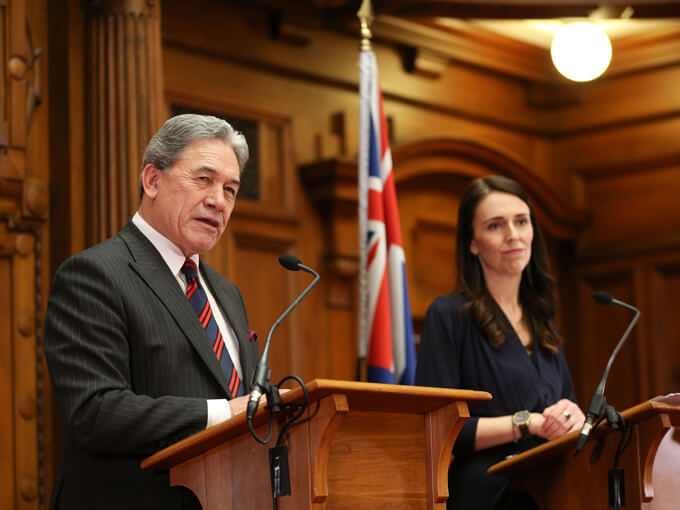Aug 9, 2019 Politics
Winston Peters is ending his love affair with Labour ahead of the 2020 election, writes Ben Thomas.
Part of the appeal of Winston Peters to his voters has been his calculated evocation of New Zealand the way it used to be. While the Prime Minister has embraced international celebrity, her deputy remains resolutely Kiwi.
And in the last few days Peters has never looked more like a classic Kiwi bloke, as he enlists the same one move that all New Zealand men can truly claim as their own: acting like a jerk so they will get broken up with.
It’s been almost two years now since he installed Jacinda Ardern to power and it’s getting harder to avoid noticing that the gregarious politician who once so jealously defended his relationship with Labour – the coalition government is Labour and New Zealand First, and the Greens better remember it – increasingly has an eye on the door.
How else to explain this week’s extraordinary outburst over abortion law reform? Peters has claimed the Labour party, and by extension its Justice Minister Andrew Little, did not act in good faith in devising abortion law reform which will make abortions more accessible up to 20 weeks into pregnancy and centre decision making on women’s choices, not on medical ruses as required under the current law.
He also declared New Zealand First MPs would not be allowed a conscience vote on the issue, and would vote as a caucus to support the bill at first reading and then withdraw support if the proposed law was not put to a public referendum.
It’s a provocative claim. It’s also nonsense. It would be harder to imagine a better faith effort than Little’s, over many months, negotiating with approved representatives from each party, including National’s outgoing former Justice Minister Amy Adams, and New Zealand First’s spokesperson for Women, Tracey Martin. Cabinet – in which Peters is the number two ranked minister – signed off the bill on Monday.
Peters sudden reversal led to Martin, the most widely liked New Zealand First MP in Parliament, tearfully telling the House she could not deliver the first reading speech she had intended to give on Tuesday.
It’s true that Peters’ stance is consistent with his broad preference for kicking issues to referenda. It’s also, of course, a fundamentally old-fashioned view that all of us should get together to decide what women do with their bodies, in the nature of a robust town hall meeting, rather than a deeply personal and individual choice that’s central to the right to bodily autonomy.
His appeal to democracy also sound ridiculous when his apparently unilateral declaration ignored, typically, the thin pretence of internal democracy within New Zealand First.
More modern people than Peters himself might call his claims “gaslighting” – but for gaslighting to work the victim has to start thinking that they’re losing their mind, not that their coalition partner is.
Peters’ goal is not to control the relationship with Labour – he already has that, by dint of a veto on policies as various as abolishing no fault trial periods for small business and the capital gains tax. His goal is to end the relationship, sometime before the 2020 election campaign, at least in the eyes of voters. But, he doesn’t want to be seen to be the cause.
Just like a deadbeat boyfriend, New Zealand First will never change with Peters at the helm. Along with the All Blacks and the New Zealand Warriors, the party has one of the most enduring and intractable institutional cultures in the country, and in only one of these cases is that a good thing.
New Zealand First has been in government before, and both times the party has failed to reach the 5% threshold needed to return to Parliament (without an electorate seat) in the next election. If current polling continues into the 2020 election, the outcome will be the same. Peters only succeeds campaigning as an outsider.
It’s nothing personal. Although Little and Peters clashed in 2017 (Peters mocked Little’s polling as Labour leader, Little called him a “blowhard” and a “swinging dick”), Peters calculations in rebelling on the Justice Minister’s three strikes legislation and now abortion reform are purely about Peters himself.
Peters’ bete noir Simon Bridges must run a cautious line on abortion reform: he is a Christian and a conservative, but also a pragmatist with an eye on the median voter, who probably supports Little’s bill (not least because she is probably a woman who currently votes Labour).
Although Peters positions himself between Labour and National for maximum bargaining power, he could not care less about the median voter. He needs 5% from anywhere, and this bill gives him an opening.
It also allows him to chip away at the coalition relationship, needling and causing unrest, and trying to provoke a meltdown that will see them part ways once and for all – at least until after the election.
In other words, it’s not them, it really is him.






